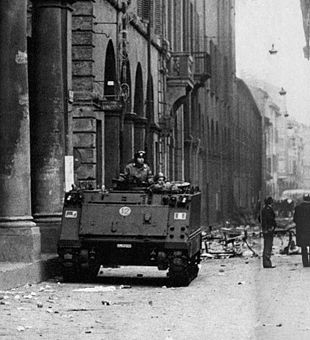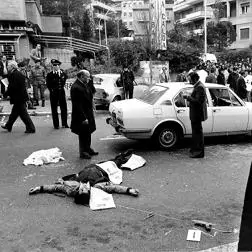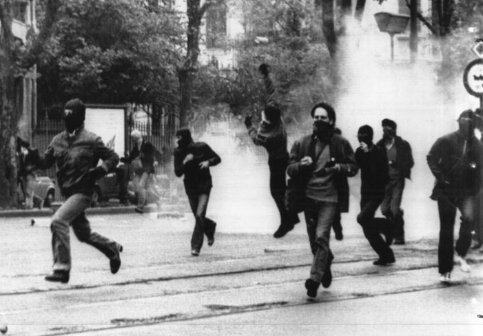Okay, it's time for my #ItalianHistory thread! Today, I'm going to talk about an interesting piece of modern history. The Cold War in Italy, and specifically...
☭ OPERAZIONE GLADIO ☭
aka the CIA network used to keep my country monitored in case it strayed further left
1/?
☭ OPERAZIONE GLADIO ☭
aka the CIA network used to keep my country monitored in case it strayed further left
1/?
Disclaimer, I'm no historian, and while I'm pretty knowledgeable about ancient & medioeval history, the Cold War in Italy and the Years of Lead are an hella complex subject which I don't feel too comfortable analyzing in depth. So take this thread as only an overview GLADIO!
2/?
2/?
Flashback to the end of WWII. By then, there was already a rift between the USSR and the USA. War-torn Europe was divided into two spheres of influence - the west under the US shadow, the east belonging to the USSR. Yay imperialism! 3/?
Italy was in a unique position: not only geographically, as it was the country of the western block bordering with USSR territory, but also politically, as among the countries under US influence, it had the strongest communist party. You can bet the US didn't like that a bit 4/?
Already in the 1948 elections, a branch of the CIA (OPC) meddled with Italian politics so to support the Christian Democracy (centrist conservative party) as opposed to the united front of the PCI (communist Italian party) and the socialists. 5/?
The covert operation was a success, the Italian communists lost the election, so president Truman was like... damn. This intelligence thing in Italy may really work! So, one year later, the SIFAR (Italian intelligence service) was born. 6/?
Despite the SIFAR being the *Italian* secret service, it collaborated closely with the CIA, to the point that many historians believe the SIFAR actually answered to the USA government, rather than the Italian one. It was, basically, a stay-behind network against communism 7/?
SIFAR and CIA worked since the beginning to undermine the rise of communism in Italy, and in 1956 they created GLADIO - a secret paramilitary organisation, a tool of control and american imperialism in western Europe, to battle communism. 8/?
GLADIO, as it's called in Italy, was part of a bigger operation - OPERAZIONE GLADIO (yes, I know, they had no imagination with names) that involved secret paramilitary forces scattered across all western European countries in order to react to an hypotetical USSR invasion 9/?
However, in Italy, GLADIO was particularly... terrifying. Both because Italy was in a very peculiar position, as I've mentioned before, and both because in Italy GLADIO - and so, the CIA, of the USA - operated what we call 'strategy of tension' 10/?
By 'strategy of tension' we identify a policy that encourages violent struggles between extremists, rather than trying to de-escalate them. It's used to describe a particularly violent time of Italian history, the Years of Lead (1969-1980) 11/?
During the Years of Lead, both far-left Marxist groups, far-right neo-fascist groups, and state agencies performed bombings, kidnappings, arsons, and murders, turning Italian cities into literal warzones. 12/?
Many historians believe that these terrible events were encouraged, if not actively orchestrated, by NATO though GLADIO. These are not wild theories - fascist terrorists confessed to having received help by SIFAR (which, remember, was in the CIA pockets) 13/?
But what was the US goal? The objective of the strategy of tension in the Mediterranean basin and of the actions of GLADIO was to destabilize my country in order to weaken the democratic process, and promote the instauration of a military dictatorship. 14/?
Since Italy had such a strong communist party, and since the country as a whole was bubbling with proletarian revolts, the USA feared that a shift of the Italian government toward communism was inevitable. Hence, the solution was to basically destroy Italian democracy 15/?
Between 1969 and 1975, more than FOUR THOUSANDS terrorist attacks were registered in Italy, 83% of them made by far right groups with the protection of the secret services, if not direct involvement. 16/?
We had no idea all of this existed - we had no idea about GLADIO, about the CIA financing domestic terrorists in our countries and helping them escape justice, until the fall of the USSR. With the end of the Cold War, the terrible truth of the Years of Lead surfaced. 17/?
For better or worse, the Christian Democracy had been in power continuously since the end of WWII. This, ironically, was what saved Italian democracy - no need to put in place a military dictatorship, if the DC could keep the communists at bay, after all 18/?
Still, one may wonder if things would have gone different in Italian elections without the terrorist attacks, the murders, the kidnappings, the strategy of tension with which the US toyed. Without GLADIO, maybe my country would have had more socialist/communist governments 19/?
On the other hand, that would probably have TRULY meant joining the USSR block and well, let's say I'm not that excited about it either  Basically Italy had to dance to the tune of either one imperialist block or the other. Yay, Cold War! 20/?
Basically Italy had to dance to the tune of either one imperialist block or the other. Yay, Cold War! 20/?
 Basically Italy had to dance to the tune of either one imperialist block or the other. Yay, Cold War! 20/?
Basically Italy had to dance to the tune of either one imperialist block or the other. Yay, Cold War! 20/?
Anyway, this was an overview of what GLADIO was, and the involvment of the USA in one of the most terrible period of Italian modern history. Note, however, that the USSR was just as bad - and most Eastern European people would testify to that - so while I despise the US for 21/?
what it did to my country, I don't want to in any way portray the communists as the good guys here. In general, the USSR was just as terrible as the US re: imperialism, and Eastern Europe still bears the scars of soviet occupation 22/?
So yeah it's really a case of both options being terrible and Italy being stuck in the middle with Andreotti. Oh G-d. I need a drink. 23/?
anyway, if you want to learn more about the Years of Lead, here's an article in English about their inciting event. 24/? https://www.charlie-allison.com/the-murder-of-the-anarchist-pinelli-and-the-beginning-of-the-years-of-lead-in-italy-1968-onwards/
and if you're curious for more history threads, browse them here! https://linktr.ee/FTacchi 25/25

 Read on Twitter
Read on Twitter




